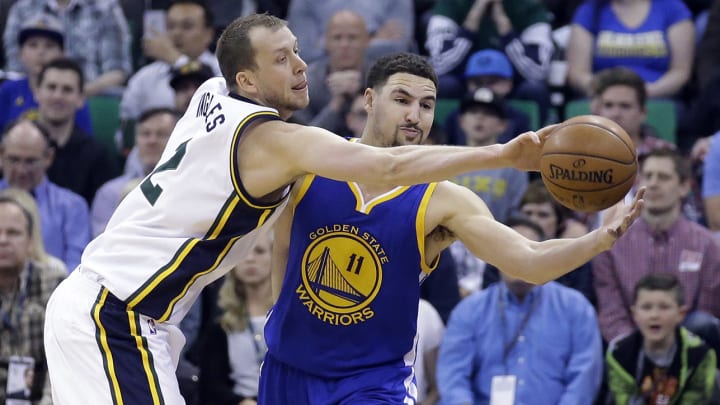Lock In: Joe Ingles Has One Job Against Golden State

The ease of a basketball game hinges on its freedom of movement. The first order of a defense is to disturb it. Drives must meet resistance. Any cutter moving freely must be bumped or bothered. Scheme is often the most compelling force in play—how a team chooses to operate speaks volumes—and yet no scheme stands a chance without persistent physicality. This is one of the qualities that most distinguishes playoff basketball: When one team knows another so well, their every move can be resisted.
This is Utah’s only hope in a series against Golden State. “They’re one of the most talented teams to take the floor, and it shows,” Jazz coach Quin Snyder said, per Jody Genessy of the Deseret News. “All you have to do is watch them on film or play them, and you feel it.”
The Biggest X-Factors For Each Team In The Second Round
What teams feel most is the overstretch. Kevin Durant, Stephen Curry, Draymond Green, and Klay Thompson present what amounts to an impossible riddle. How does any team have the defensive personnel to defend three of the best shooters in NBA history, each spread over the positional spectrum? What team has the combination of quickness and size necessary to cover Durant and Green sufficiently? Entire game plans could be devoted to slowing Curry or Durant. Now teams must reckon with both at once, divying up resources and diverting attentions in a way that leaves them vulnerable.
“The most dangerous part,” Snyder said, “is you can’t choose a most dangerous part. There’s so many of them.”
The starting point, almost inevitably, comes from an attempt to slow any of the Warriors’ most dangerous threats. The good news for the Jazz is that Rudy Gobert can work as a spatial catch-all. Some of the drives that pad out the production of Durant and Curry will be met with the full counterweight of the best rotational defender in the league. That allows Utah to play as aggressively on the perimeter as they’ll need to, and in particular, helps Joe Ingles to dedicate his defensive existence to locking and trailing.
Some of what perplexed the Clippers in the first round was that no matter what actions they tried, J.J. Redick could never get open. If Redick received the ball on a pitch, Ingles closed the gap with length:
When Redick tried to counter by changing directions, he was met with pressure on his dribble:
Hand-offs were jammed and shots prevented. One of the best off-screen shooters in the league was completely bottled, to the point that Clippers coach Doc Rivers wasn’t playing Redick in situations he normally would have. A roster riddled with liabilities gained another—all because Ingles (and to an extent, Rodney Hood) took away what Redick does best.
Based on what we saw in the regular season, Utah will likely call on Ingles to chase Thompson in the same way:
When done right, this sort of trailing can upend one arm of an offense. The damage compounds. If all goes perfectly, Ingles will be able to bother some of Thompson’s shots and deny others. Even for a well-conditioned curler like Thompson (or Redick), that can be dispiriting. They can wind up standing still more than they should—largely out of frustration. When the shooter is having trouble separating, they tend to rush shots before they’re set or push off as a way to clear airspace. That it’s so much easier for an official to see that shove than the holds that preceded it only adds to the exasperation.
Thompson will keep going, but players tend to run harder when they feel their efforts are making a real difference. Make every cut a chore and they’ll begin to treat it like one. Yet what makes containing Thompson so different from containing Redick is where those frustrated possessions go. The Clippers had little choice but to dump every broken play into the lap of Chris Paul, who was exhausted and ailing as it was.
Biggest Surprises And Disappointments From The NBA Playoffs
Take away shots from Thompson, however, and they’ll redistribute naturally—to Curry, to Durant, or to some other Warrior through the course of the team’s ball movement. Even if Ingles were able to put Thompson on an island (which is somewhat unlikely to begin with, given that he doesn’t have the same kind of height advantage with which to bother Thompson’s shots), every other layer of defense needs to be accounted for.
George Hill is similarly relentless in his pursuit around screens, with length enough to wedge his way through and distress a shooter on the other side. Hayward is a sharp defender who understands how to get in the way of an opponent and shuffle his feet to stay there. These are strong defenders, but Curry and Durant lay waste to strong defenders routinely. Thompson, too. There’s precedent for the Jazz being able to slow the Warriors, but what’s obvious is that no one can stop them. Even flawless execution of a well-conceived strategy cannot always reach so many deadly scorers at once. To play against the Warriors is to tread in peril.
